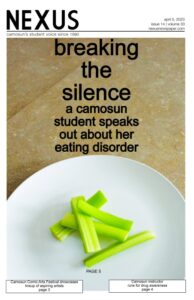The English language is one of the more challenging languages to learn. English is loaded with rules, with teaching methods that don’t always apply or even make sense. For instance, “i before e except after c” is one of the first grammar laws we are told to memorize, yet there are plenty of times when this grammar rule is tossed aside (it’s weird and makes me feisty). There are words like “tough,” “sought,” “dough,” and “bough,” which all have the same spelling pattern but very different pronunciations. These unpredictable patterns in the English language are just the tip of the iceberg, which brings me to another frustrating aspect of the language: idioms, or euphemisms.
An idiom is a word or expression that is used as a substitution for a word or expression that could be considered too blunt, embarrassing, or just boring. When I used “tip of the iceberg,” it was a more interesting way to say “just the beginning.” When somebody says, “I’m on fire,” it’s a fancy way of saying that they are accomplishing a lot.

This is easy for people who grew up speaking English, but for a non-native speaker, it’s confusing. They might end up physically checking the person they are conversing with to make sure they aren’t engulfed in flames.
A euphemism is a type of idiom, and it’s also used to replace a word or situation which is considered embarrassing, uncomfortable, or vulgar. A euphemism is used to soften the blow (idiom), to make a situation easier to bear. Euphemisms are everywhere, and are used to sugar-coat (idiom) what might be normally a tough thing to talk about. They’re used in the workplace: “you’re being let go” instead of “you’re fired.” They are very commonly used when talking about sex: “we made it to third base” instead of “we touched each other’s genitals.” I mean, can you imagine talking about a sexy moment like that literally? It would sound embarrassing, although kind of funny, to everyone around.
Euphemisms are most used when talking about death. Rarely is the word “dead” used; people most often say “passed away.”
The thing about these handy expressions is they discourage honesty, especially when talking to children. How many kids grow up not really understanding death, and are really surprised (or traumatized) when they find out what actually happened to Grandma when they were told she “went with God” was that she was dead?
As teenagers or adults, How many people are told “I need some space” by their sweetheart instead of being told plainly that the relationship is over?
Euphemisms can make a situation easier to deal with, however, it often leaves things confusing and open-ended, and only made easier on the person doing the talking. There’s a certain point when we have to start trusting that people might be able to handle the truth. Honesty is uncomfortable at times, but will make things easier in the long term.
